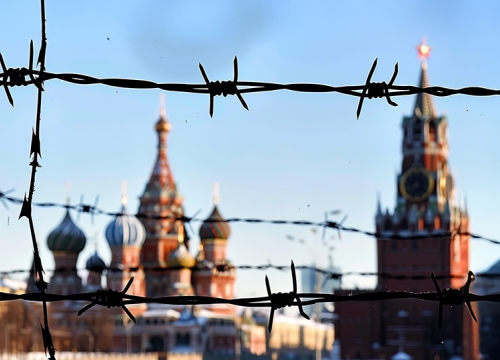Silencing the Voices of Defiance : Russia’s strategy of repression at home and aggression abroad
Event


Adobe
Background
In its resolution 57/20, the Human Rights Council, renewed the first-ever mandate of the Special Rapporteur on the situation of human rights in the Russian Federation, citing grave concerns over the continued and significant deterioration of the situation of human rights in the country.
In her third report, presented in Geneva on 22 September 2025, United Nations Special Rapporteur on the situation of human rights in the Russian Federation, Mariana Katzarova, underscores how Russia has intensified its repression not only against domestic critics but also against those who dare to speak truth about the war in Ukraine. Journalists, cultural figures, and human rights defenders who document or criticise Russia’s military actions face politically motivated prosecutions under charges such as “discrediting the armed forces”, “spreading fake news”, or “extremism”.
The crackdown is not limited to silencing dissent inside Russia; it deliberately targets those who reveal abuses committed in Ukraine. Ukrainian journalists and media workers have been subjected to arbitrary arrest, torture, and long-term imprisonment in Russia or Russian-occupied territories. At least 29 remain behind bars. Russian journalists who reported on atrocities against Ukrainian civilians have faced prison sentences of up to 12 years, while organisations documenting war crimes have been branded as “foreign agents” or “undesirable”.
The Special Rapporteur’s findings confirm that repression of anti-war voices is inseparable from the broader strategy of disinformation and censorship that enables Russia’s war. The systematic persecution of those exposing war crimes—including enforced disappearances, unlawful deportations, and torture of Ukrainian civilians and prisoners of war—serves a dual purpose: silencing truth-tellers inside Russia and denying accountability abroad.
As observed by the Special Rapporteur in her findings, since the full-scale invasion of Ukraine in February 2022, the Russian state has advanced an increasingly consolidated ideology centred on the defence of “traditional values” and the portrayal of Russia as engaged in an existential struggle against external threats. This narrative has become explicitly linked to justifying military aggression abroad and intensifying repression at home, framing dissent as betrayal and reinforcing loyalty through state-sponsored nationalism, cultural conformity and distortion of “historical truth” about the Soviet-era Stalinist crimes.
Objective
This event will bring together the UN Special Rapporteur, Russian and Ukrainian journalists, cultural figures, and human rights defenders to discuss how Russia suppresses voices revealing the truth about its war against Ukraine. Speakers will provide first-hand accounts of imprisonment, torture, censorship, and exile, while highlighting the urgent need to protect freedom of expression and support accountability. The event will explore recommendations for:
- Ending politically motivated prosecutions against anti-war voices in Russia;
- Releasing imprisoned Russian and Ukrainian journalists, human rights defenders and cultural figures as well as all Russian political prisoners and Ukrainian civilians held in Russian detention;
- Protecting truth-tellers documenting Russia’s war crimes in the war against Ukraine and opposing the repression within Russia;
- Ensuring accountability for repression against civil society, dissidents and anti-war activists.
Speakers
- Mariana Katzarova, United Nations Special Rapporteur on the situation of human rights in the Russian Federation.
- Svetlana Alexievich, writer, Nobel Prize Laureate in Literature 2015, banned from Russia’s school curriculum.
- Svetlana Gannushkina, founder and head of the Civic Assistance Committee, providing support to refugees and migrants in Russia, repeatedly nominated for the Nobel Peace Prize for her human rights work.
- Elena Zhemkova, the Executive Director of Memorial, Russia's oldest human rights organisation, which was awarded the 2022 Nobel Peace Prize.
- Alsu Kurmasheva, Russian journalist for the Tatar-Bashkir Service, former political prisoner freed in historic August 2024 prisoner swap.
- Vladyslav Yesypenko, Radio Free Europe/Radio Liberty Ukrainian journalist for Crimea. Realities, former political prisoner released from Russian detention in June 2025.
Moderator – Imogen Foulkes, BBC Geneva Correspondent
Elena Cook, professional interpreter and translator who has been helping the SR Russia mandate with translation services will provide simultaneous interpretation during the event.
The event will be followed by an apéro.
No photos or recording allowed during the event.



